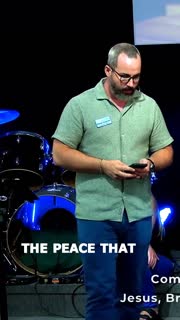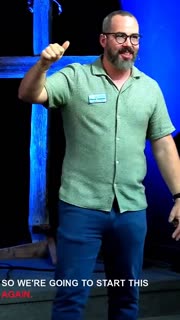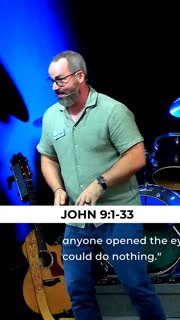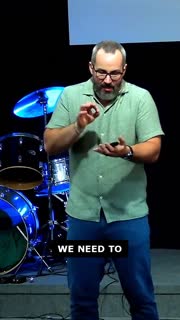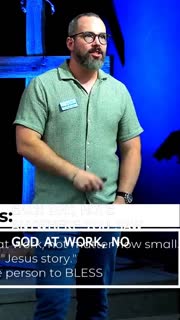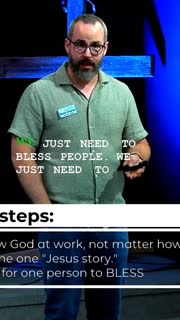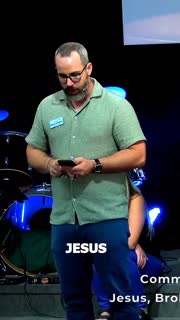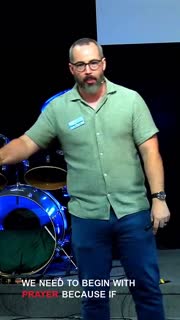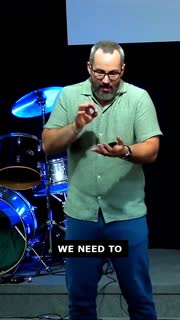Embracing Thanksgiving Through Storytelling and Peace
Devotional
Sermon Summary
Bible Study Guide
Sermon Clips
1. "The peace that he brought to the Jews did more than free them from the corruption of Rome. Jesus offers all people a spiritual peace more enduring than any government can deliver. It is a peace that calms our hearts in every chaos, a peace that strengthens our spirit during every sickness. Jesus's peace, transcends culture and language and encompasses the entire universe." [34:01] (30 seconds)
2. "In order to complete this, in order to be a storyteller, you have to become a story collector. And there's side benefits. It's not just for those of you that want to be able to share good experiences with others or help people come to know Jesus. This is even good for those of you that are like, I don't even know this Jesus, dude. I don't even know why I came to church this morning. Because when we begin to collect stories, we begin to become more thankful." [48:49] (60 seconds)
3. "Sharing your story doesn't require deep theological knowledge or insight. Because when people push back on it, oh yeah, yeah, yeah, I'm sure that's what it was. You don't think it was just a coincidence. Guess what? All you have to say is, all I know is where I was and where I am now. You can argue with the experience as much as you want, but all I know is this was happening. I reached out to God and this started happening." [59:57] (36 seconds)
4. "We need to become people who collect stories about what's happening in our life, in other people's lives. It's okay. If you witness it, write it down. And I'm not saying that you have to be a master. You don't need to do the next spinoff of Seinfeld. You don't need to do the next take on Seinfeld, okay? You don't need to be the next person that does Friends or whatever other sitcom from the 90s, 80s, whatever, that we want to talk about. But we need to take time to record." [01:08:28] (30 seconds)
5. "Each day, note anywhere you saw God at work, no matter how small. I'm literally talking about like a bullet point, just enough to help you remember. Each week, refine one Jesus story. Take one of those bullet points and flesh it out. Which one was most impactful? Just build that out so you can remember and work through it. This is literally something. Take five minutes each day, 15 minutes each week." [01:11:15] (28 seconds)
6. "We just need to bless people. We just need to share our story. We just need to make friends with people that need Jesus and genuinely make friends because we like them. Make friends because we want to be their friends and give God, opportunities to use us to change the world that we live in. Because God knows this world needs to turn around. This world needs hope. It needs help. It needs peace. The peace that Jesus gives, that he brings." [01:11:15] (31 seconds)
7. "Jesus offers all people a spiritual peace more enduring than any government can deliver. It is a peace that calms our hearts in every chaos, a peace that strengthens our spirit during every sickness. Jesus's peace, transcends culture and language and encompasses the entire universe and so today you hold in your hands the reminders of the things that make for peace these things that Jesus spoke about on his way to Jerusalem the bread and the cup." [34:01] (38 seconds)
8. "We need to begin with prayer because if we don't have God on our side, then what are we doing? We need to be listening to people so that we build relationship and eating with them so that there's community and connection between us. We need to be serving them because how many of you know that if Jesus changes your heart, he's going to change the way that you live." [01:02:50] (18 seconds)
9. "Paul, he's under house arrest. He's under house arrest. He's under house arrest by the empire of Rome. And he writes to the church in Philippi who are heavily persecuted. And what are the words that I would say to a persecuted church? Hang in there, right? You got this. Maybe rub some dirt in it. Get up again. Let's go. My kids would say that's probably something I would say. Rub some dirt in it. Get up. It's fine. Move on. What does he say? Rejoice. Rejoice in the Lord always. Again, I will say rejoice." [01:09:41] (34 seconds)
10. "We need to become people who collect stories about what's happening in our life, in other people's lives. It's okay. If you witness it, write it down. And I'm not saying that you have to be a master. You don't need to do the next spinoff of Seinfeld. You don't need to do the next take on Seinfeld, okay? You don't need to be the next person that does Friends or whatever other sitcom from the 90s, 80s, whatever, that we want to talk about. But we need to take time to record." [01:08:28] (30 seconds)
Ask a question about this sermon
2. "In order to complete this, in order to be a storyteller, you have to become a story collector. And there's side benefits. It's not just for those of you that want to be able to share good experiences with others or help people come to know Jesus. This is even good for those of you that are like, I don't even know this Jesus, dude. I don't even know why I came to church this morning. Because when we begin to collect stories, we begin to become more thankful." [48:49] (60 seconds)
3. "Sharing your story doesn't require deep theological knowledge or insight. Because when people push back on it, oh yeah, yeah, yeah, I'm sure that's what it was. You don't think it was just a coincidence. Guess what? All you have to say is, all I know is where I was and where I am now. You can argue with the experience as much as you want, but all I know is this was happening. I reached out to God and this started happening." [59:57] (36 seconds)
4. "We need to become people who collect stories about what's happening in our life, in other people's lives. It's okay. If you witness it, write it down. And I'm not saying that you have to be a master. You don't need to do the next spinoff of Seinfeld. You don't need to do the next take on Seinfeld, okay? You don't need to be the next person that does Friends or whatever other sitcom from the 90s, 80s, whatever, that we want to talk about. But we need to take time to record." [01:08:28] (30 seconds)
5. "Each day, note anywhere you saw God at work, no matter how small. I'm literally talking about like a bullet point, just enough to help you remember. Each week, refine one Jesus story. Take one of those bullet points and flesh it out. Which one was most impactful? Just build that out so you can remember and work through it. This is literally something. Take five minutes each day, 15 minutes each week." [01:11:15] (28 seconds)
6. "We just need to bless people. We just need to share our story. We just need to make friends with people that need Jesus and genuinely make friends because we like them. Make friends because we want to be their friends and give God, opportunities to use us to change the world that we live in. Because God knows this world needs to turn around. This world needs hope. It needs help. It needs peace. The peace that Jesus gives, that he brings." [01:11:15] (31 seconds)
7. "Jesus offers all people a spiritual peace more enduring than any government can deliver. It is a peace that calms our hearts in every chaos, a peace that strengthens our spirit during every sickness. Jesus's peace, transcends culture and language and encompasses the entire universe and so today you hold in your hands the reminders of the things that make for peace these things that Jesus spoke about on his way to Jerusalem the bread and the cup." [34:01] (38 seconds)
8. "We need to begin with prayer because if we don't have God on our side, then what are we doing? We need to be listening to people so that we build relationship and eating with them so that there's community and connection between us. We need to be serving them because how many of you know that if Jesus changes your heart, he's going to change the way that you live." [01:02:50] (18 seconds)
9. "Paul, he's under house arrest. He's under house arrest. He's under house arrest by the empire of Rome. And he writes to the church in Philippi who are heavily persecuted. And what are the words that I would say to a persecuted church? Hang in there, right? You got this. Maybe rub some dirt in it. Get up again. Let's go. My kids would say that's probably something I would say. Rub some dirt in it. Get up. It's fine. Move on. What does he say? Rejoice. Rejoice in the Lord always. Again, I will say rejoice." [01:09:41] (34 seconds)
10. "We need to become people who collect stories about what's happening in our life, in other people's lives. It's okay. If you witness it, write it down. And I'm not saying that you have to be a master. You don't need to do the next spinoff of Seinfeld. You don't need to do the next take on Seinfeld, okay? You don't need to be the next person that does Friends or whatever other sitcom from the 90s, 80s, whatever, that we want to talk about. But we need to take time to record." [01:08:28] (30 seconds)
